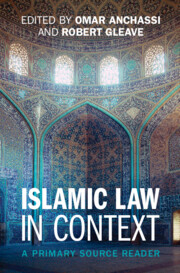Book contents
- Islamic Law in Context
- Islamic Law in Context
- Copyright page
- Contents
- Acknowledgements
- Contributors
- Introduction
- Part I Islamic Legal Theory (Uṣūl al-Fiqh) and Related Genres
- Part II Islamic Jurisprudence (Fiqh) and Related Genres
- Chapter 7 Introduction to Part II
- Chapter 8 The Kitāb al-Umma, or Ṣaḥīfat al-Madīna
- Chapter 9 Section on Lawful Food from al-Mabsūṭ fī Fiqh al-Imāmiyya of Muḥammad b. al-Ḥasan al-Ṭūsī (d. 460/1067)
- Chapter 10 ‘The Treatise of Refutation of those who Criticise [Our] Conduct’ (Kitāb al-Radd ʿalā man Ṭaʿana fī l-Sīra) Attributed to Imām al-Mutawakkil ʿalā Allāh, Aḥmad b. Sulaymān (d. 566/1170)
- Chapter 11 Menstruating Women and Visiting the Mosque
- Chapter 12 Section on the Law of Rebellion from the Radd al-Muḥtār of Ibn ʿĀbidīn (d. 1252/1836)
- Chapter 13 Offer and Acceptance in Islamic Marriage
- Chapter 14 Treatise on Jihad and Migration
- Chapter 15 Alms Tax (Zakāt) in Shīʿī Law
- Chapter 16 A Difficult Case of Divorce
- Part III Legal Opinions (Fatwās)
- Part IV Court Judgments and Other Court Documentation
- Part V Judicial Manuals and Reference Books
- Part VI Alternative Sources for Islamic Legal Studies
- Name Index
- Subject Index
- References
Chapter 13 - Offer and Acceptance in Islamic Marriage
The Discussions of al-Mujāhid al-Ṭabāṭabāʾī (d. 1242/1827) in his Manāhil al-Aḥkām
from Part II - Islamic Jurisprudence (Fiqh) and Related Genres
Published online by Cambridge University Press: 14 November 2024
- Islamic Law in Context
- Islamic Law in Context
- Copyright page
- Contents
- Acknowledgements
- Contributors
- Introduction
- Part I Islamic Legal Theory (Uṣūl al-Fiqh) and Related Genres
- Part II Islamic Jurisprudence (Fiqh) and Related Genres
- Chapter 7 Introduction to Part II
- Chapter 8 The Kitāb al-Umma, or Ṣaḥīfat al-Madīna
- Chapter 9 Section on Lawful Food from al-Mabsūṭ fī Fiqh al-Imāmiyya of Muḥammad b. al-Ḥasan al-Ṭūsī (d. 460/1067)
- Chapter 10 ‘The Treatise of Refutation of those who Criticise [Our] Conduct’ (Kitāb al-Radd ʿalā man Ṭaʿana fī l-Sīra) Attributed to Imām al-Mutawakkil ʿalā Allāh, Aḥmad b. Sulaymān (d. 566/1170)
- Chapter 11 Menstruating Women and Visiting the Mosque
- Chapter 12 Section on the Law of Rebellion from the Radd al-Muḥtār of Ibn ʿĀbidīn (d. 1252/1836)
- Chapter 13 Offer and Acceptance in Islamic Marriage
- Chapter 14 Treatise on Jihad and Migration
- Chapter 15 Alms Tax (Zakāt) in Shīʿī Law
- Chapter 16 A Difficult Case of Divorce
- Part III Legal Opinions (Fatwās)
- Part IV Court Judgments and Other Court Documentation
- Part V Judicial Manuals and Reference Books
- Part VI Alternative Sources for Islamic Legal Studies
- Name Index
- Subject Index
- References
Summary
This chapter explores the reasoning of al-Mujāhid al-Ṭabaṭabāʾī (d. 1242/1827) in his Manāhil al-Aḥkām as it relates to the question of offer and acceptance (ījāb wa-qabūl) in the context of marriage. Ordinarily, as in contracts of sale, offer would precede acceptance, but because of social norms surrounding marriage (and women’s agency), this order is reversed. The author justifies this reversal in terms of past authorities and custom. The passages excerpted in this chapter discuss how and when this reversal of the expected order might be possible, and in the course of the discussion cover many other important issues, such as whether marriage contracts operate in precisely the same way as other contracts, and the composition of the formulae for offer and acceptance.
Keywords
- Type
- Chapter
- Information
- Islamic Law in ContextA Primary Source Reader, pp. 141 - 154Publisher: Cambridge University PressPrint publication year: 2024

